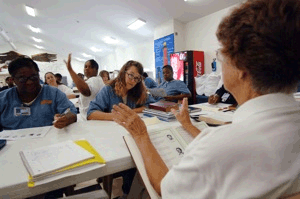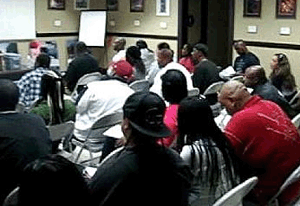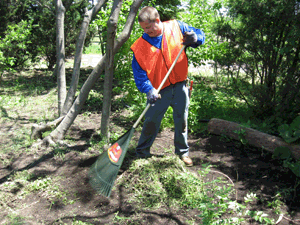Could ex-offenders be the key to stimulating growth and stability in our economy? According to the Summit County Reentry Network (SCRN), ex-offenders may just have what it takes. With statistics such as:
• 1 in 100 Americans being in prison or jail (Pew Report,2008)
• Approximately 9 million people being released from jails every year (Urban Institute, Justice Policy Center)
• And, out of 65 million adults, 1 in every 4 Americans having an arrest record (National Employment Law Project
…this makes up a very large portion of our population!
Through collaboration, the SCRN is working to reduce the percentage of ex-offenders who return to crime (recidivate). At the same time, they are enhancing community safety and promoting family reunification.
Having ex-offenders reenter society and become productive citizens could create major changes in our city, and world, as we know it. These people need jobs and a second chance. Once ex-offenders become employed, they will contribute to the economy through taxes and the purchase of goods and services, along with paying off their child support, court fees and fines.
Entities such as the SCRN may just be the missing link needed to connect everyone in this "reentry realm", including ex-offenders, grassroots organizations, businesses, ect.
The SCRN is currently working with over 80 different agencies in this collaborative initiative.

History of SCRN
It all goes back to 2006 when a number of agencies, such as Broken Chains Ministry, United Way, the Job Center and others, came together, forming a loose collaboration. Their mission was to help those getting out of jail or prison get back on their feet.
"They came together after realizing that different people were doing things with reentry, like the Oriana House and Akron Urban League," Terry Tribe-Johnson, Summit County Reentry Coordinator, said.
By coming together, they realized they could do more. They developed a strategic plan, but unfortunately struggled to keep it going.
"The initiative faded altogether," Tribe-Johnson said.
But this wasn't the end of SCRN. In 2009, the Summit County Health Department came to the Division of Public Safety, explaining the importance of reentry into society for ex-offenders and they agreed to take on the SCRN, giving it a fresh, new start.

No Time like the Present
"Governor Strickland has talked about releasing a lot of low-level, first-time offenders from incarceration. All of the evidenced based practices suggest that when people come back to the community and are given supportive services there is much less of a chance of them returning to crime," Tribe-Johnson explained.
What does this mean for our community? Less crime, violence, theft, danger and fear for our citizens.
The SCRN came back to life last fall, with a meeting on October 3rd. There they developed four subcommittees, including: Advocacy Issues, Education and Training, Planning, and Research and Evaluation.
Over 80 people showed up at their second meeting this past February and there are now about 50 people serving on the subcommittees.
The group continues to grow.
"We now have over 80 agencies and churches represented that have some kind of reentry service for ex-offenders," Tribe-Johnson said.

Stereotypes and Labels
Some are hesitant to help these people, but it is important to understand that not all offenders are equal.
"Not all people with felonies have been in prison. Some have been in jail, others on probation and parole," Tribe-Johnson explained of the different levels of offense.
For example, in our state, non-payment of child support is considered a felony conviction. Once one gets a felony conviction they lose their driver's license and in many cases are incarcerated.
"I talked to a fellow recently who said 'I didn't pay my child support. That was wrong of me, but now I've been put in prison, I lost my job, lost my license, and I can't look for another job in my field because none of them are on bus routes - so I have no income. I also lost my apartment because I lost my job'," Tribe-Johnson shared, of this man's misfortune.
This domino effect destroys lives, having a trickle-down effect on families and the community.
"How is that helping this man take responsibility for his mistakes?" Tribe-Johnson asked.
Good question.
"It's just devastated his life and now he has nothing with which to really even survive himself, let alone make his child support payments and have a sense of reconciliation with what he did wrong," she said, "So I'm really glad there are statewide things going on as well as federal (to fix this)."

The Job Crisis
The SCRN is advocating for ex-offenders to be considered on a case-by-case basis when looking for a job.
"There is a lot of competition out there for jobs, so people who've been convicted of a felony often get pushed aside, which leaves out a lot of qualified people," Tribe-Johnson said.
"There are a lot of qualified people coming back into the community who have a particular passion, the skills, and a desire to work. Research shows that when people who really want to change their lives and work for you are hired there can be an above average level of loyalty to that company," she continued.
For some employers, just seeing that someone has been convicted of a crime is enough for them to toss their resume.
"Don't just deny the whole population because they've had a felony," Tribe-Johnson said, "You and I could be someone who has a history and is denied a position because of it. These people look like you and me. All people with felonies aren't murderers and rapists."
There are five levels of felonies, as well as different levels of misdemeanors and offenses.
"Not everyone with a sexual offense is a predator. Someone could be caught urinating behind a stadium and someone sees them, is offended and they get charged with exposure and have to become a registered sex offender," Tribe-Johnson explained.
"So often people who have a felony get painted with this horrific brush, and we forget that they look just like you and me. I've gotten calls from City Council where people have said 'My neighbor's son… my friend's son… made a really stupid decision. Can you help him or her get hooked up for employment?'"
"Most of us are one lucky opportunity away from having been charged with something stupid we did in our youth," Tribe-Johnson said.

Fighting Against Collateral Sanctions
"We have people on the SCRN who've had a history in the criminal justice system and have worked through issues and are regaining their lives. We welcome their input because they help us know where the biggest roadblocks are," Tribe-Johnson continued.
Federal and State Collateral Sanctions are some of the biggest barriers to people who are looking for employment. There are over 400 of these roadblocks, that act as barriers for ex-offenders, concerning housing, employment, certifications, and other things regarding regaining their livelihood.
For example, prisoners can be taught how to be a barber in prison, but collateral sanctions keep them from using their skills when they get out. They aren't able to get certified as a barber, hairdresser, or nail stylist if they have a felony.
"Thankfully the state of Ohio Director Mohr wants to look at the number of collateral sanctions in Ohio and reduce the ones that don't make any sense," Tribe-Johnson said.
The Civil Impacts of Criminal Convictions Database (CIVICC) provides helpful information regarding collateral sanctions. Launched just this March, it is the only one like it in the United States. This data base will allow Judges, Lawyers, case managers, ex-offenders and/or family members in Ohio to:
• Enter the felony charge in question and learn what "CIVICC"(s) pertain to that charge (i.e. what are the "Collateral Sanctions").
• Enter a career goal and learn which corresponding charges would prevent them from pursuing certain educational/employment choices.
This will save offenders time and money as they search for a career to pursue upon their release. Many have taken classes, even graduated from college only to find that they weren't able to work in their field due to a past felony. This will hopefully put an end to that.
A "Reentry Resource Seminar" for ex –offenders and their families is schedules to be held monthly at The Job Center, located at 1040 E. Tallmadge Ave. in Akron from 10 a.m. until noon on the fourth Friday of each month. This event highlights information about employment, housing, social services and many other topics that are keys to successful reentry.
Representatives from different businesses, organizations and fields will be on-site to lend assistance. For example, representatives from Huntington Bank will offer free checking and/or savings accounts to people who have been released from incarceration.
For more information on these meetings or the SCRN in general, please call 330.643.2003 or email reentry@summitoh.net.
To read Part Two of the story click the link.